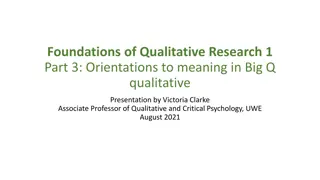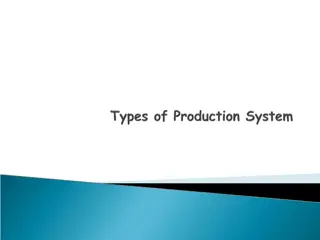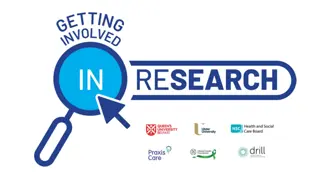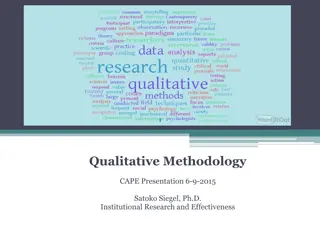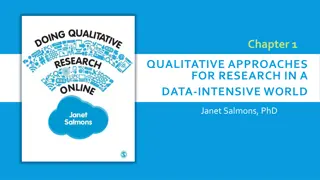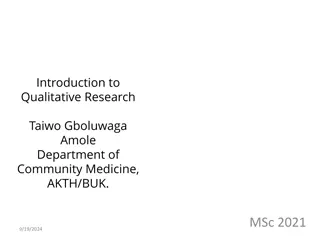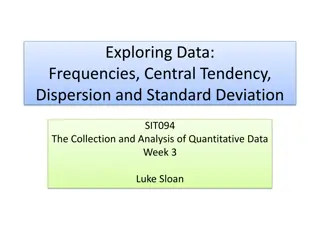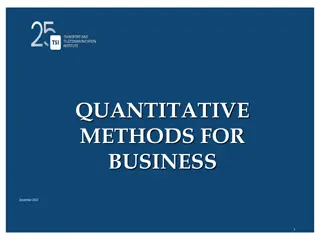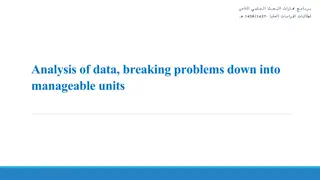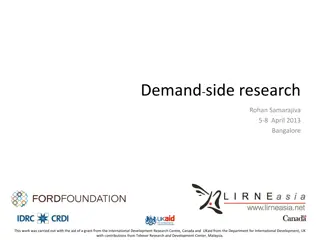Qualitative and Quantitative Methods in Knowledge Production
Both qualitative and quantitative methods play crucial roles in research design and knowledge production. These methods provide tools to explore, evaluate, and critically analyze findings, allowing for the production of robust and credible knowledge. By understanding the different questions each methodology asks about social phenomena, researchers can gain valuable insights and perspectives. The aim of method courses is to equip practitioners with critical thinking skills to question existing knowledge and generate their own. Through a combination of both qualitative and quantitative approaches, researchers can broaden their understanding and enhance their research capabilities in various academic practices.
Download Presentation

Please find below an Image/Link to download the presentation.
The content on the website is provided AS IS for your information and personal use only. It may not be sold, licensed, or shared on other websites without obtaining consent from the author.If you encounter any issues during the download, it is possible that the publisher has removed the file from their server.
You are allowed to download the files provided on this website for personal or commercial use, subject to the condition that they are used lawfully. All files are the property of their respective owners.
The content on the website is provided AS IS for your information and personal use only. It may not be sold, licensed, or shared on other websites without obtaining consent from the author.
E N D
Presentation Transcript
Qualitative and Quantitative Methods or It s all Knowledge Production Dr Joanna Ferrie School of Social & Political Sciences
Our aims in producing these slides: 1. To help colleagues engage with broader ideas of knowledge production and research design. 2. To give colleagues some of the tools to understand the fundamentals of research (or project) design 3. To access the learning opportunities of quantitative and qualitative exercises
Producing Knoweldge Let s think of your assignments relating to academic practice: What are you being examined against? Of Value To others Methodologically sound Robust Intellectually advanced
Both Quants and/or Qual are helpful to your evaluations because - They will expose you to research by others that has had impact, and help you understand their contribution They will strengthen intellectual and critical evaluation skills as you can explore how findings were produced, rather than just think about the findings claimed Will teach you the fundamental methodology towards knowledge production and will give you the tools to produce credible, robust and rigorous knowledge
So our aim in producing the methods courses Is to give you all the skills you need to move your critical thinking on as practitioners So while these courses are methods focused, they are designed to Help you gain the tools to question knowledge And produce your own knowledge
Why teach Quals and Quants Each approach allows to explore your practice But they allow you to ask different questions
Why? Because each methodology essentially asks a different question about the social phenomenon. Thinking about a study of poverty: Quants can definitively tell us how many people live in poverty Discourse analysis can tell us how the power of the rich is maintained through rhetorical devices Structural equation modelling can reveal the contribution of education, lifestyle and legacy issues on existing poverty Regression can allow us to predict what levels of poverty a person may experience given knowledge about known factors Phenomenology will tell us what it feels to be without hope Social Psychoanalytic approaches may tell us how easily people in poverty internalise their structured experiences and blame themselves Grounded theory allows us to ask again, how do we know what poverty is?
So . Your job is to get as familiar with as many different approaches as possible Not at the expense of the method you choose to concentrate on an assignment But as an exercise in understanding the context in which you are producing knowledge To fully understand what other options were available to you Likely to be asked to defend your choice, at least briefly, in your assignment
Quantitative Ontology Ontology is a slippery concept. It relates to how we know, and in the social sciences is most related to how we know the social world It can be thought of a position taken This allows us to think of ontology as being influenced by our experiences (how have they made us more left or more right wing in our politics?) or critically, by theory In quantitative approaches, the basic ontological position is that social worlds are mathematical problems. This position was massively informed by the birth of Universities as we know them to be today, and is related to the advancements that emerged through the Enlightenment. Essentially, we became able to use mathematics to measure, compare, predict and evaluate, and these mechanisms related to social worlds, is called social statistics, or quantitative methods.
Quantitative Epistemology Epistemology is another slippery concept, but essentially means how we learn about the world So if the social world is a giant mathematical problem to be solved, then a quantitative epistemology says we ought to collect numerate data in order to better understand it. There are two types of data broadly speaking: categorial and continuous. Continuous is data that has equidistant intervals, such as weight, time, income or expenditure on mental health services for example. These do have mathematical properties. For example if two adults co- habit, then the income of one, plus the income of the other gives us the income of the household. The maths rarely gets more difficult than this.
Still Quant Epistemology but a note on Categorical data Our social worlds tend not to be made up of continuous data. Then tend to be made up of categorical. These are meaningful groupings, that are given a numerate label in order to manage analysis. BUT the numerate label has no mathematical properties. An example: Buses are numbered, but the number represents a route + = ? So adding 2 and 4 does not give us the route of 6. Because 6 doesn t mean the number between 5 and 7. Here 6 means a particular route with a start and end; plus it means the stops on the way; or it means something more abstract like how I get home or the driver may understand the 6 as being work . Categorical data represents chunks of meaning, and we need to know what each of these numbers mean. And this principle allows us to measure or capture, loads of chunks of social data.
Rationale for Quantitative Methods So far we understood the root of why Quants, and some bits about how we measure using quants. The rationale is about the research question, and about being interested in asking questions that require a quantitative answer We use Quants if: We want to know about a lot of people We want to directly compare our results with a different study (e.g. human rights indicators) We want to be able to make some predictions We want to work with particular kinds of data, such as big data (such as that held by google), administrative data (such as that held by the NHS) or secondary data (such as that hosted by the UK Data Archive
Quantitative Examples. Here are 2 reports that use quantitative methods very well. They re fairly accessible with lots of data visualizations (and no equations). Scottish Crime Justice Survey on Partner Abuse Fair Society, Health Lives
Qualitative Ontology For us, the meaning of ontology becomes clear when we apply it. When applied to qualitative methods the ontology becomes that social worlds are made up of words: written and spoken It is how we negotiate our social worlds that produce them. Qualitative methods are less homogenous than quantitative and there are in fact competing ontologies for example: Phenomenology is an approach that works to foreground the experiences of each individual and thus has an ontological position of social worlds are understood subjectively Discourse analysis, borrowing heavily from the work of Foucault, foregrounds the words we have in the dictionary and how we can use them, as the basis for understanding social worlds and thus has an ontological position that social words are understood discursively
Qualitative Epistemology Qualitative researchers learn about the world by collecting discursive data Again depending on the ontological position of the researcher it may take them to some forms of data over others For example, a phenomenologist almost always wants to speak directly with participants in long, and sometimes multiple interviews The discourse analyst is interested in any for of data that captures discourse including diaries, manifestos, interviews but may be particularly drawn to focus groups where participants can negotiate how society governs behaviours and freedoms Alternatively an anthropologist interested in ethnography is interested in collating various forms of data to reach an holistic viewpoint and may use observation AND interviews AND diaries AND more
Rationale for Qualitative Methods We use Qualitative if: We want to really understand how something works (and it makes sense to talk a lot to a smaller group of people) We want to make a case study a one-off exploration rather than a comparative piece We want to explain how things are We want to understand the use of rhetorical devices in explaining behaviour (e.g. link between manifestos and voting) We want to immerse ourselves in a community to understand it
Qualitative Examples Here are 2 reports that use qualitative methods very well. They offer some insight too into how the data was produced. Our Bodies, Our Rights - Research Report Making sense of violence in civil war: challenging academic narratives through political ethnography https://www.tandfonline.com/doi/full/10.1080/21624887.20 13.824654




